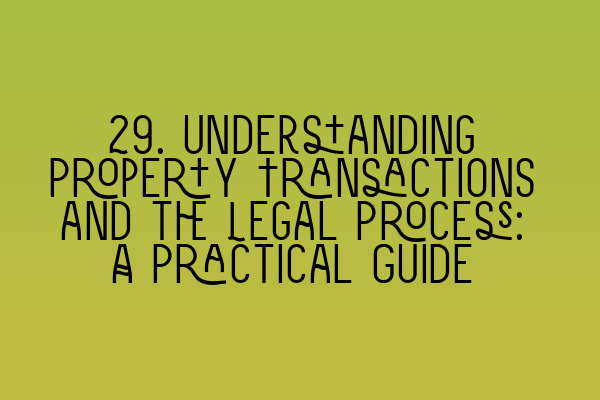Understanding Property Transactions and the Legal Process: A Practical Guide
At SQE Property Law & Land Law, we understand the importance of guiding individuals through the complex legal process involved in property transactions. Whether you are buying, selling, or leasing a property, it is essential to have a clear understanding of the legal steps involved to ensure a smooth and successful transaction.
The Legal Process of Property Transactions
Property transactions can be overwhelming, with various legal requirements and documentation that need to be considered. To help you navigate through this process, we have curated a practical guide to understanding property transactions and the legal steps involved.
Step 1: Engaging a Solicitor
The first step in any property transaction is to engage a solicitor who specializes in property law. A solicitor will provide valuable advice, handle all legal documentation, and ensure all necessary searches and checks are undertaken.
Once you have engaged a solicitor, they will begin the process by conducting local authority searches, environmental searches, and any other relevant searches to identify any potential issues that may affect the property’s value or your use of it.
For a comprehensive understanding of the legal process, it is crucial to brush up on your knowledge of property law. Our SQE 1 Practice Exam Questions can help you test your understanding and identify any areas that require further study.
Step 2: Property Inspection and Valuation
Before finalizing a property transaction, it is essential to inspect the property thoroughly and have it valued by a professional. This step helps you ascertain the property’s condition, identify any necessary repairs, and determine its current market value.
By undertaking a property inspection, you can avoid any potential surprises or hidden costs that may arise after the transaction. Additionally, having a professional valuation will assist you in negotiating the purchase price effectively.
For further preparation on property valuation, consider taking our SQE 2 Preparation Courses to sharpen your understanding of property valuation principles.
Step 3: Drafting and Reviewing Contracts
Once you have completed the property inspection and valuation, your solicitor will draft and review the necessary contracts and agreements. It is crucial to have a legally binding contract that protects your interests and clearly states the terms and conditions of the transaction.
During this stage, your solicitor will also ensure that all relevant legal obligations and disclosure requirements are fulfilled. This includes obtaining an Energy Performance Certificate (EPC) and providing any necessary documentation related to the property’s regulatory compliance.
If you wish to test your knowledge of contract law in relation to property transactions, our SQE 1 Practice Mocks FLK1 FLK2 can be a helpful resource.
Step 4: Exchange of Contracts
Once both parties have agreed to the terms outlined in the contracts, the next step is the exchange of contracts. This is a critical milestone in the property transaction process as it legally binds both the buyer and seller to fulfill their obligations.
At the point of exchange, the buyer usually pays a deposit, typically 10% of the purchase price, which is held by the seller’s solicitor until completion. The completion date will also be agreed upon during this stage.
To ensure you are well-prepared for the exchange of contracts, take a look at our SQE 1 Preparation Courses that cover the key areas of property law.
Step 5: Completion and Post-Completion
Completion is the final stage of the property transaction process. On the agreed completion date, the buyer pays the remaining balance to the seller’s solicitor, and legal ownership of the property is transferred to the buyer.
After completion, there are still post-completion tasks to be addressed. These may include ensuring the property is properly insured, registering the property with the Land Registry, and notifying relevant authorities about the change of ownership.
For more information on the legal aspects of completion and post-completion tasks, refer to our SRA SQE Exam Dates article, which offers valuable insights into the topics covered in the SQE exams.
Conclusion
Property transactions involve a complex legal process that should not be underestimated. Engaging a solicitor who specializes in property law is essential to ensure a smooth and legally secure transaction.
By following the practical guide outlined above, you will have a strong foundation in understanding property transactions and the legal steps involved. Remember to take advantage of the related articles linked throughout this blog post to deepen your knowledge in specific areas.
At SQE Property Law & Land Law, we are committed to providing comprehensive legal assistance for all property transactions. Whether you are a first-time buyer or an experienced investor, our team of experts is here to guide you through every step of the process.
